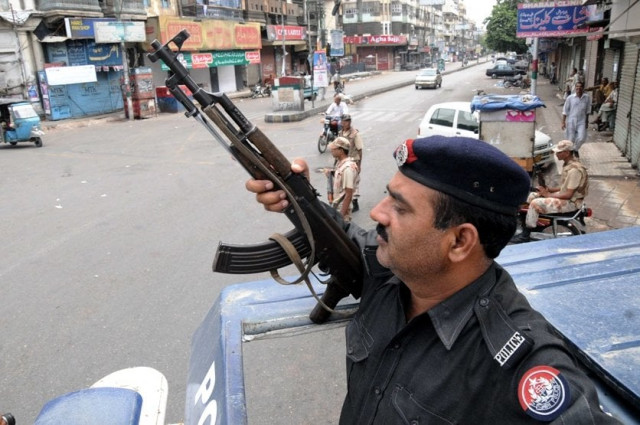Choosing office space in times of deteriorating law and order
Businesses that want to continue operating in Karachi have limited options.

The prevailing security situation in the city has forced entrepreneurs to change the selection criteria for office space. PHOTO: RASHID AJMERI/FILE
Such businesses look for office space in safe and secure surroundings. Due to this, offices currently available in high-rise commercial complexes within the city remain mostly unoccupied, because they are not considered secure enough.
Since II Chundrigar Road – also known as the Wall Street of Pakistan – has reached a saturation point and has no space to offer up-and-coming entrepreneurs, builders have turned to Shahrae Faisal, keeping in view its strategic position, and Clifton, with the latter being an upscale locality.
In a span of ten years, a number of commercial plazas have sprung up on both sides of the Shahrae Faisal avenue. These buildings offer 2.7 million square feet of ‘office grade’ space, while the rest can be graded as ‘B’ and ‘C’ category real estate. Clifton, on the other hand, offers 2.2 million square feet of ‘office space’ grade estate. Unfortunately, out of total available office space, only 8% can be classified as ‘A’ grade space. This is usually taken up by company-operated tailor-made head offices such as the MCB Tower, PSO House, Faysal House and Harbour Front, which faces the Arabian Sea.

The prevailing security situation in the city has forced entrepreneurs to change the selection criteria for office space. The priorities of low-price and proficient-sizing have now been changed to ‘good secure location with ample space for parking’. Other vital attributes which affect decisions are on-site car parking, easy accessibility, cutting edge IT and communication facilities, availability of utility services, high-speed elevators, and, above all, an uninterrupted supply of electricity. Any complex which ensures all these facilities and services will not face any problem in getting occupants.
At present, Karachi’s gems and jewellery market is concentrated primarily around key retail areas, which, according to a rough estimate, comprise of 5,000 units employing 500,000 persons. The Sarrafa Bazaar is the largest, followed by Tariq Road, Saddar, Clifton, Nazimabad and Liaquatabad. Workshops are usually situated in the back street of retail outlets. These workshops are typical one-unit rooms of very small sizes, ranging between 70-120 square feet. Each workshop, regardless of its size, accommodates around 3 to 7 workers. These units have no facilities, except an enclosed room with a window.

According to the Pakistan Gems and Jewellery Development Company (PGJDC), the sector has tremendous growth potential, keeping in view the natural reserves of gems found in Pakistan and the global demand for end products. However, despite a phenomenal increase of over 100% in exports, this sector has failed to bring about any change in the environment and working conditions of its labour force.
Those involved in the business do wish for an improvement in the overall scenario, but are reluctant to shift their businesses in the absence of a state-of-the-art business complex which ensures a safe and secure surrounding.
Similarly, the IT sector has emerged as an important participant in the country’s economic growth. According to the State Bank’s annual report, Pakistan’s IT sector posted rapid growth on the back of growing domestic demand for automation, along with an increasing demand for business outsourcing in developing countries that provided a boost to our IT exports. Currently, around 1,306 small and medium sized IT companies are operating in the country. The total size of the IT sector is estimated to be worth $2.8 billion. The sector holds great potential to grow, but continuous power failures and unavailability of proper ISP connections greatly hampers business operations. Hence, this sector is also in search of a complex which is ideally suited for them.
Fortunately, the National Industrial Parks Development & Management Company (NIP) now offers suitable plots for both sectors. It also offers corporate offices at their flagship project – Korangi Creek Industrial Parks (KCIP). All interested businesses can construct dedicated state-of-the-art high rise buildings which ensure 48 megawatts captive power generation for uninterrupted electricity, round-the-clock security, gated entrance with a perimeter wall, an underground utility corridor, metalled roads, and a host of other facilities. The processing of all these facilities will be done by NIP under its one-window operation system.
Published in The Express Tribune, February 11th, 2013.
Like Business on Facebook to stay informed and join in the conversation.



















COMMENTS
Comments are moderated and generally will be posted if they are on-topic and not abusive.
For more information, please see our Comments FAQ